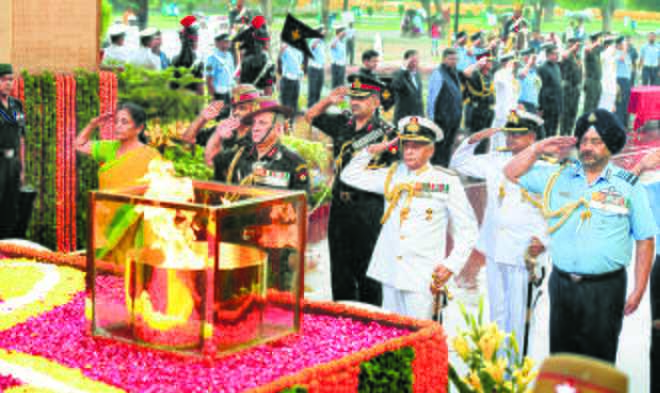Gen VP Malik (Retd) & Major Navdeep Singh (Retd)
 THE decision-making process of the defence establishment with its myriad complexities has always remained a vexed issue. It has been a cause of alienation for people in uniform with court cases, delays in acquisitions and procurements, lack of integration and jointness.
THE decision-making process of the defence establishment with its myriad complexities has always remained a vexed issue. It has been a cause of alienation for people in uniform with court cases, delays in acquisitions and procurements, lack of integration and jointness.
The Rules for Allocation and Transaction of Business, 1961, have no role or powers ascribed to the defence forces. The Defence Secretary is responsible for ``Defence of India" and ancillary facets during war with the armed forces and the three Service Headquarters subordinately designated as "Attached Offices of the Department of Defence".
The professional heads of the three services neither have been accorded a status nor granted any powers in the edifice of the Government.
The obvious reason is that for many years after independence, there was deep-rooted suspicion, fuelled by happenings in the neighbourhood, as to whether the military in India would continue to remain in barracks or would take to adventurism. Although the defence services have remained staunchly loyal to the Constitution, certain vested interests have not allowed obliteration of that suspicion. As a result, the military has been kept in a box, not allowed to participate in policy or decision-making.
Our political establishment, hence, despite the vastly changed strategic environment and the imperative need to consult defence chiefs directly, has been deprived of this facilitation. Some Defence Ministers like Jaswant Singh and Pranab Mukherjee, and PMs like Indira Gandhi and Atal Bihari Vajpayee, met the service chiefs more often than others but an institutionalised system and decision-making processes were never resolved.
Over a period of time, cosmetic changes such as limited financial powers and minimally altered file movement system were made. Some nomenclatures changed but within the Ministry, the old terminology and processes continue. Despite ruling party manifesto calling for "greater participation of Armed Forces in the decision-making process", not much has happened.
While the inherent suspicion towards the military waned with time, the pretext of 'checks and balances' gained momentum for keeping the defence services out of actual decision-making. But whether a counter-balance as at present, wherein decisions of the Chiefs of Staff Committee are allowed to be commented upon by junior non-specialist civilians should continue, or whether a collegiate system be instituted can be taken subject to the approval of the political executive.
The system currently followed, besides causing suspicion and distrust, often results in delays and sometimes imbalanced decisions. While the decisions of the military should not be allowed to prevail without question, the conclusions should be based upon collation of proper views of all stakeholders on an equal footing before they are put up to the political authority for sanction.
It is also a matter of concern that in some spheres where powers have been delegated, the system is being rendered infructuous with too much leeway being displayed by military authorities. To take an example, powers to determine disability benefits of officers have been conferred upon military authorities and appellate committees. However, such proposals, though in consonance with procedure, are abandoned by senior military authorities based upon objections by junior finance officers.
One solution is instituting a format such as the "Defence Board". Within that, a judicious mix of senior military and civil officers could debate proposals and then reach a consensus which can then be put up for approval of the Minister. The Defence Board is not an alien concept among democracies. The UK has a Chief of Defence Staff for its strategic and operational needs as a single point military consultant. It also follows a Board system chaired by the Defence Minister with members from civil and defence services and also non-executive board members.
Closer home, the Railway Board is headed by the Railways Minister and comprises a healthy mix of members from different cadres and technical streams.
India has a large strength of defence services involved not only in external defence but also in internal security and aid to civil authorities. In these days of rapid socio-political changes, we cannot have a system where affected parties or end-users are not consulted adequately, or where decisions are taken based on faulty inputs by non-experts through one-way file notes. The correct system would require a face-to-face real time collegiate discussion before decisions are made. "Defence of India" involves not just the military but almost all other institutions; even the citizenry.
The Constitution requires the military to work under political, not bureaucratic control. As in all democracies, it has an important role to play. Being treated as a redundant appendage militates against the basic grain of a democracy and also hampers execution of its modern day role.
The political class should find a juste milieu ensuring an equal voice for all stakeholders with the ultimate decision-making power vested with the political executive as laid down in our Constitution.
No comments:
Post a Comment